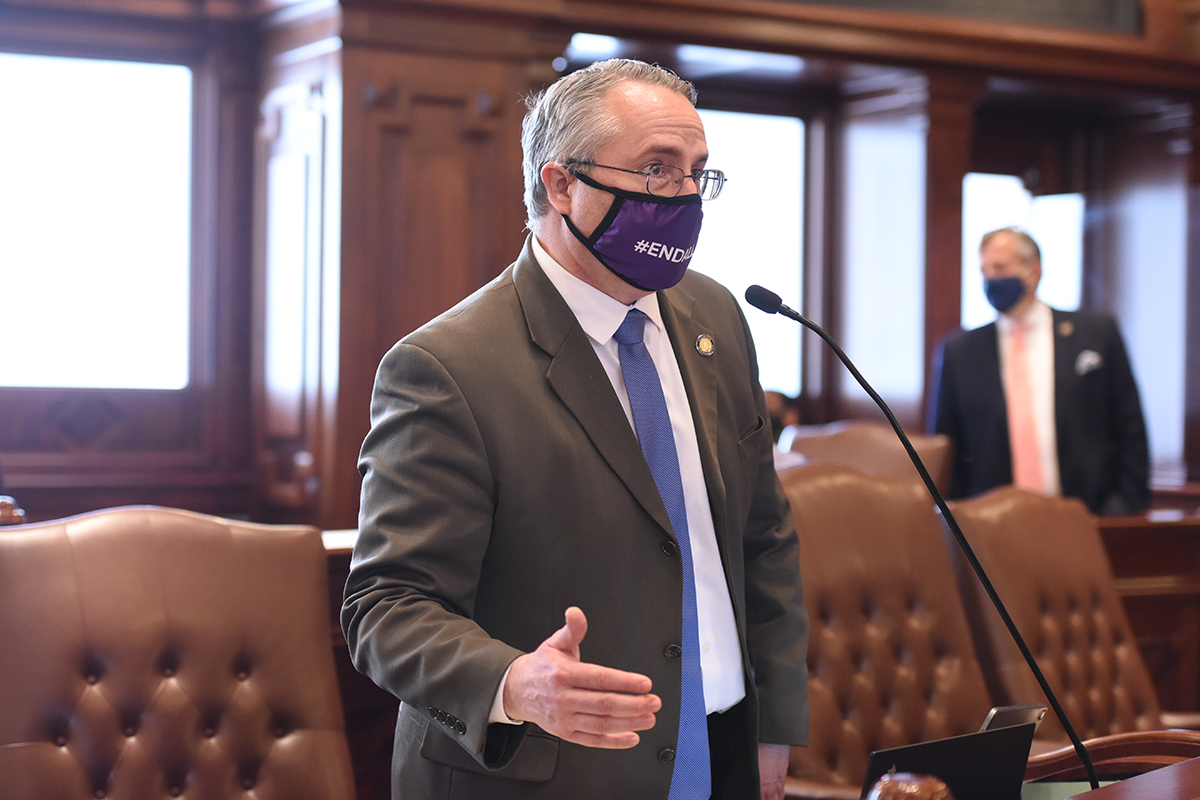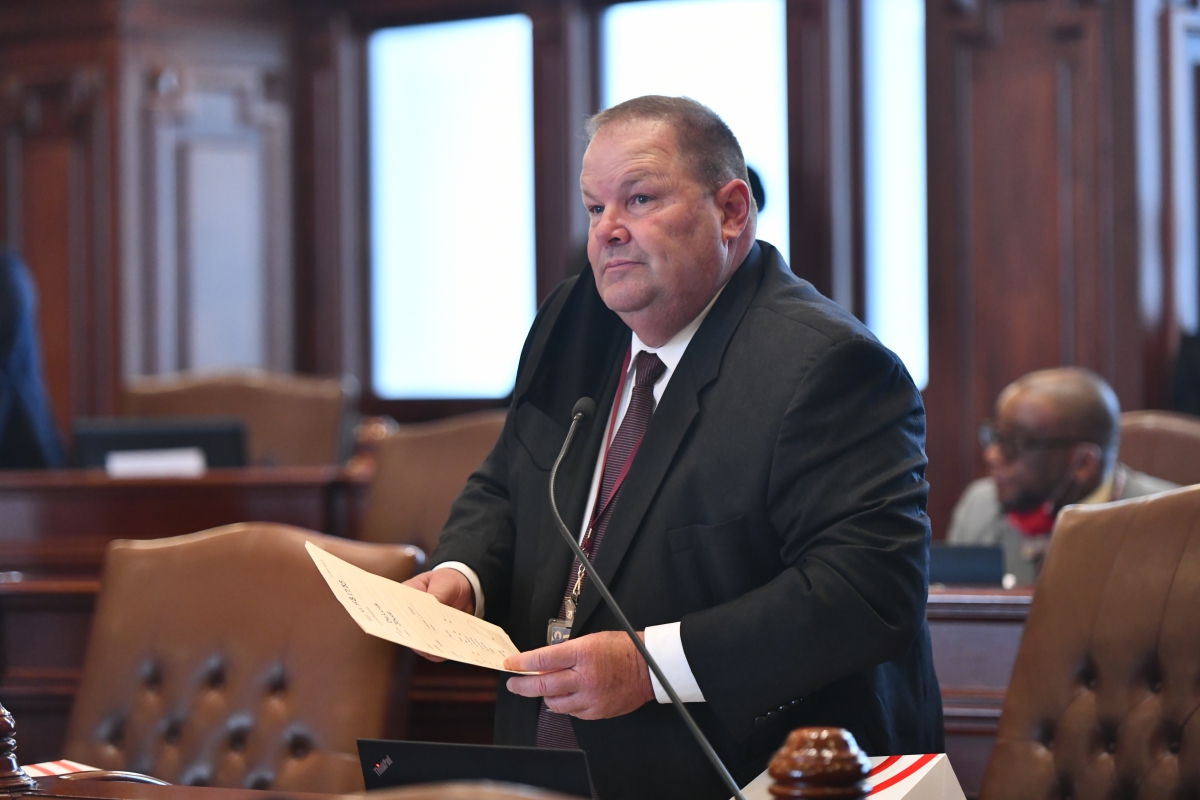- Details
- Category: Senator John Connor News
 SPRINGFIELD – A measure sponsored by State Senator John Connor (D-Lockport) that would require the monitoring and reporting of racial bias in hiring processes that rely on Artificial Intelligence passed the Senate on Tuesday.
SPRINGFIELD – A measure sponsored by State Senator John Connor (D-Lockport) that would require the monitoring and reporting of racial bias in hiring processes that rely on Artificial Intelligence passed the Senate on Tuesday.
“It’s important to ensure that qualified applicants have the employment opportunities they deserve,” Connor said. “We wouldn’t stand for racial bias in intrapersonal hiring processes, why should we accept it in technological ones?”
An increasing number of large companies are using Artificial Intelligence in their hiring processes. Prospective employees use a web link to record themselves answering a series of designated questions either verbally or by typed response, and the company’s AI software then analyzes the video to assign scores to facial expressions, word choice, body language and vocal tone. Advancement of applicants is based on this assigned score.
House Bill 53 requires companies that rely on AI screenings to select candidates to document and report the race and ethnicity of all screened applicants, both those hired and those rejected. Under this legislation, these reports are to be sent to the Department of Commerce and Economic Opportunity, where the data would be analyzed and shared with the Governor and General Assembly.
The legislation passed the Senate with 43 votes.
- Details
- Category: Senator Laura Ellman News
 SPRINGFIELD – A measure sponsored by State Senator Laura Ellman (D-Naperville) that would ensure no person is arrested while seeking help for someone suffering an opioid overdose passed committee on Tuesday.
SPRINGFIELD – A measure sponsored by State Senator Laura Ellman (D-Naperville) that would ensure no person is arrested while seeking help for someone suffering an opioid overdose passed committee on Tuesday.
“No one should ever go without lifesaving care, because another person is worried they will be charged with a crime,” Ellman said. “We need to ensure that the good deed of trying to save a life does not result in punishment.”
The measure, also known as “Alex’s Law,” would ensure that people who seek emergency assistance for an individual experiencing symptoms of an opioid overdose will not be arrested for any crime related to the use of drugs at the scene. The legislation aims to prevent situations where an individual dies from an opioid overdose due to the other people present fearing arrest if they call for help.
The idea for the measure came from the death of a 25-year-old Naperville resident, Alex Green, who died of a fentanyl overdose in 2018. Alex had been with others at the time of his overdose, but none of the others on the scene called 911 for assistance. This meant the officers who arrived on scene were not able to identify what had happened until it was too late, despite having Narcan (a medicine used to treat opioid overdoses) with them at the time.
“Had an unknown person who was on hand accompanied Alex into a public business and alerted staff that his friend was overdosing, proper 911 calls may have been made,” said Bill Green, Alex’s father and the original proponent of the legislation. “Friends, strangers and passersby need to know that it’s always safe to help someone in distress, so they may see those they love at least one more day.”
Ellman, Green, and other proponents hope that Alex’s law will lead to more people contacting 911 when others around them suffer an opioid overdose, potentially saving lives.
House Bill 3445 passed the Senate Criminal Law Committee by unanimous vote and now heads to the Senate floor for further consideration.
- Details
- Category: Senator Laura Murphy News
 SPRINGFIELD – To ensure Illinois college students can afford the tools they need to learn, State Senator Laura Murphy (D-Des Plaines) has advanced legislation to create a task force dedicated to making textbooks and other course materials more affordable.
SPRINGFIELD – To ensure Illinois college students can afford the tools they need to learn, State Senator Laura Murphy (D-Des Plaines) has advanced legislation to create a task force dedicated to making textbooks and other course materials more affordable.
“The school year is over, and many recent high school grads are preparing for college—and the financial stresses that often come with it,” Murphy said. “It’s time to examine ways our schools can lift some of that burden for students and their families.”
The legislation would create the Course Materials Equitable Access and Affordability Study Task Force, which would research ways to save students money on course materials, examine digital learning materials in response to the COVID-19 pandemic, and publish its findings online.
Using these findings, the task force would identify best practices for colleges and universities with an eye toward improving affordability, ensuring access to required course materials by the first day of class, and securing better outcomes for students—especially minority, low-income and first-generation students.
“No student should have to skip buying a textbook because they can’t afford it,” Murphy said. “This task force will ensure every college kid in Illinois can get the most out of their courses.”
House Bill 332 advanced out of the House in April and passed the Senate Tuesday without opposition.
- Details
- Category: Senator Patrick Joyce News
SPRINGFIELD – After hearing from residents who felt helpless when Rich East High School closed their doors in 2020, State Senator Patrick Joyce (D-Essex) passed legislation through the Senate Tuesday to prevent neighborhood schools from closing without public input.
“Closing a neighborhood school without public input can have serious consequences on the lives of students, families and educators,” Joyce said. “It’s important that residents have the chance to offer feedback on decisions that would impact their kids and the communities they live in.”
In 2019, District 227 was faced with the decision to close one or more of their three schools due to a lack of funding, declining enrollment and aging facilities. The Rich Township High School District in Cook County voted to close Rich East High School, which served Matteson, Park Forest, Olympia Fields, Chicago Heights and Richton Park residents. This decision forced these students to move to either Rich Central or Rich South High Schools.
Read more: Joyce fights to make residents’ voices heard on neighborhood school closures
- Details
- Category: Senator John Connor News

SPRINGFIELD – Legislation sponsored by State Senator John Connor (D-Lockport) that extends homestead exemptions for individuals with disabilities and senior citizens without reapplication advanced out of the Senate Monday evening.
“I am always proud to step up and be a voice for populations in our state who may be most in need,” Connor said. “Providing an exemption for at-risk communities means keeping more Illinoisans safe from exposure to COVID-19 or other potentially dangerous illnesses.”
Homestead exemptions can be approved for people with disabilities, veterans with disabilities and older adults without new applications under House Bill 3289. Any property that was approved for the exemption in the 2019 taxable year will qualify, provided that the county the property is in declared a local disaster related to the COVID-19 pandemic.
- Details
- Category: Senator Robert Martwick News
SPRINGFIELD – Today State Senator Robert Martwick (D-Chicago) passed legislation that ensures medical coverage for first responders injured in the line of duty.
“Our firefighters and police officers put themselves in danger every day. When they are injured in service to our community, their medical treatment should be covered,” said Martwick.
Under current law, if a police officer or firefighter is injured while working and they receive immediate medical care, the city will cover the cost of medical treatment for duty-related injuries. House Bill 1777 requires the city of Chicago to notify injured first responders that they might qualify for duty benefits, which cover the full cost of medical treatments from an injury that occurred in the line of duty. The legislation also requires the city to pay for qualified treatment prior to issuing the notice.
- Details
- Category: Senator Rachelle Crowe News

SPRINGFIELD – To give young people the tools to recognize and prevent opioid abuse, State Senator Rachelle Crowe (D-Glen Carbon) advanced legislation through the Senate to educate students on the dangers of opioid addiction.
“Young students and athletes may be prescribed opiates to relieve pain from injuries or surgeries before learning the risks of abuse,” Crowe said. “It’s important that kids know the health consequences associated with opioid misuse and dependency before entering high school.”
According to the Illinois Department of Public Health, 54 Illinois residents ages 15-24 fatally overdosed in 2019, with an additional 581 non-fatally overdosing. Crowe’s plan would begin engaging students in age-appropriate discussions on opioid abuse from kindergarten to eighth grade.
Read more: Crowe’s plan to educate students on addiction prevention passes Senate
- Details
- Category: Senator Tom Cullerton News

SPRINGFIELD – To undo discrimination the LGBTQ+ community historically faced in the military, State Senator Tom Cullerton (D- Villa Park) has passed legislation that would allow veterans who received an “Other than Honorable” discharge for their sexuality or gender identity to begin receiving state veterans benefits.
“As a veteran, I understand how much these benefits from the state can help veterans. From housing to assistance with burial, state benefits play a large role in supporting our veterans,” Cullerton said. “For someone not to receive this assistance solely because of their sexual orientation or gender identity is outdated and unfair.”
Although the “Don’t Ask, Don’t Tell” policy – which barred gay and lesbian military members from openly serving in the military – was repealed in 2011, people with OTH dischargers from years ago are still not able to receive state veterans benefits. According to a report from Harvard Law School, more than 100,000 service members were expelled from the military between World War II and 2011 for their actual or perceived sexual orientation.
Read more: Cullerton: One step closer to restoring benefits to LGBTQ+ veterans in Illinois
More Articles …
Page 476 of 762















 © 2026 Illinois Senate Democratic Caucus
© 2026 Illinois Senate Democratic Caucus